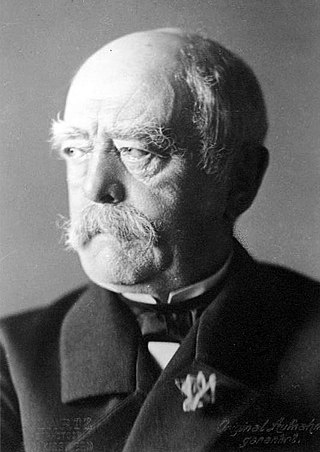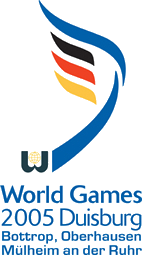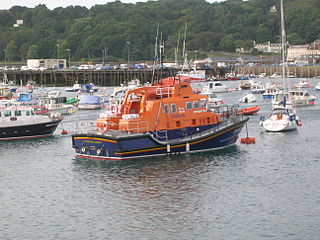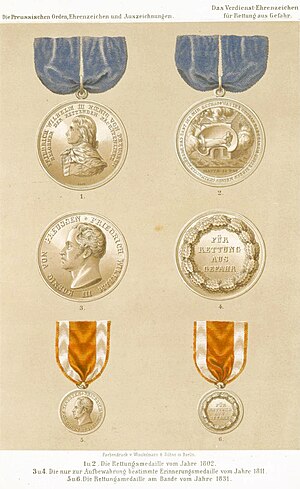
Otto, Prince of Bismarck, Count of Bismarck-Schönhausen, Duke of Lauenburg was a Prussian statesman and diplomat who oversaw the unification of Germany. Bismarck's Realpolitik and firm governance resulted in him being popularly known as the Iron Chancellor.
German submarine U-556 was a Type VIIC U-boat of Nazi Germany's Kriegsmarine during World War II. She was laid down on 2 January 1940 at the Blohm & Voss yard in Hamburg as yard number 532, launched on 7 December 1940, and commissioned on 6 February 1941 under the command of Kapitänleutnant Herbert Wohlfarth, who commanded her for her entire career that lasted less than five months. U-556 conducted only two patrols, sinking six ships totalling 29,552 gross register tons (GRT) and damaging one other of 4,986 GRT, before she was sunk on 27 June 1941.

William I, or Wilhelm I, was King of Prussia from 1861 and German Emperor from 1871 until his death in 1888. A member of the House of Hohenzollern, he was the first head of state of a united Germany. He was de facto head of state of Prussia from 1858, when he became regent for his brother Frederick William IV. During the reign of his grandson Wilhelm II, he was known as Wilhelm the Great.

The Navy and Marine Corps Medal is the highest non-combat decoration awarded for heroism by the United States Department of the Navy to members of the United States Navy and United States Marine Corps. The medal was established by an act of Congress on 7 August 1942, and is authorized under 10 U.S.C. § 6246.

The Gold Lifesaving Medal and Silver Lifesaving Medal are U.S. decorations issued by the United States Coast Guard. The awards were established by Act of Congress, 20 June 1874; later authorized by 14 U.S.C. § 500. These decorations are two of the oldest medals in the United States and were originally established at the Department of Treasury as Lifesaving Medals First and Second Class. The Department of the Treasury initially gave the award, but today the United States Coast Guard awards it through the Department of Homeland Security. They are not classified as military decorations, and may be awarded to any person.

The Pacific Star is a military campaign medal instituted by the United Kingdom in May 1945 for award to British and Commonwealth forces who served in the Pacific Campaign from 1941 to 1945, during the Second World War.
The Army of Occupation Medal is a military award of the United States military which was established by the United States War Department on 5 April 1946. The medal was created in the aftermath of the Second World War to recognize those who had performed occupation service in either Germany, Italy, Austria, Japan or Korea. The original Army of Occupation Medal was intended only for members of the United States Army, but was expanded in 1948 to encompass the United States Air Force shortly after that service's creation. The Navy and Marine equivalent of the Army of Occupation Medal is the Navy Occupation Service Medal, which features the same ribbon with its own medallion and clasps.

United States law enforcement decorations are awarded by the police forces of the United States of America. Since the United States has a decentralized police force, with separate independent departments existing on the state and local level, there are thousands of law enforcement decorations in existence.

The 2005 World Games, the seventh World Games, were an international multi-sport event held in Duisburg, Germany from 14 July 2005 until 24 July 2005. Three other cities, namely Bottrop, Mülheim an der Ruhr, and Oberhausen, also held some of the competition events. More than 3,000 athletes competed in 31 official sports and 6 invitational sports.
Orders, decorations, and medals of the German Empire covers those decorations awarded by the states which came together under Prussian leadership to form the German Empire in 1871. For convenience's sake, this category also covers the decorations of the various German states which were no longer in existence in 1871, mainly because they had been annexed by Prussia during the Wars of Unification or before.
Clint David Robinson, OAM is an Australian sprint kayaker and surf lifesaver. He has achieved significant success at the Summer Olympics, winning a total of three medals: a gold medal in the K-1 1000 meters at the 1992 Olympics, a silver medal in the K-2 500 meters at the 2004 Olympics, and a bronze bronze medal in the K-1 1000 meters at the 1996 Olympics.
The honours system in the Republic of Austria is a means of rewarding individuals' personal achievement, or service to Austria by state decorations and medals.
The Gesetz über Titel, Orden und Ehrenzeichen, often shortened to Ordensgesetz, is a federal law of Germany detailing the treatment and handling procedures for civilian and military decorations. The law was put into effect on July 26, 1957, and fulfilled two primary purposes. First, it stipulated how medals and military decorations from before 1945 should be handled. Second, it was intended to describe treatment and procedures for medals in the Federal Republic of Germany.
The lifesaving events at the 2009 World Games in Kaohsiung was played between 23 and 25 July. 96 athletes from 8 nations participated in the tournament. The competition took place in Kaohsiung Swimming Pool for pool events and in Sizihwan Bay for beach events. For both men and women, there were four individual events in pool lifesaving, three individual events in beach lifesaving, and an overall team event combining five non-medal team and relay events in pool and beach disciplines.
The Sarvottam Jeevan Raksha Padak is a civilian lifesaving award presented by the Government of India. Established on 30 September 1961, the award was originally called the Jeevan Raksha Padak, Class I.

Max Looff was a naval officer of the Imperial German Navy, who reached the rank of Vizeadmiral and later a military writer. Looff commanded the cruiser SMS Königsberg during the Battle of Rufiji Delta before it was sunk by two Royal Navy monitors, HMS Mersey and Severn on 11 July 1915.
The Jeevan Raksha Padak is a civilian lifesaving award presented by the Government of India. Established on 30 September 1961, the award was originally called the Jeevan Raksha Padak, Class III.

St Peter Port Lifeboat Station is located at St Peter Port, capital of the Bailiwick of Guernsey, and main port of the island of Guernsey, a self-governing British Crown Dependency and one of the Channel Islands.
The orders, decorations, and medals of the German states, in which each states of Germany has devised a system of orders and awards to honour residents for actions or deeds that benefit their local community or state, are in turn subsumed within the German honours system. Each state sets their own rules and criteria on eligibility and also how each medal is awarded and presented. Most of the orders allow for the recipient to wear their orders in public.

The lifesaving events at the 2001 World Games in Akita was played between 24 and 26 August. 90 athletes from 9 nations participated in the tournament. The competition took place in Akita Prefectural Pool for pool events and in Iwaki Island Park for beach events. For both men and women, there were four individual events in pool lifesaving, three individual events in beach lifesaving, and an overall team event combining five non-medal team and relay events in pool and beach disciplines.











